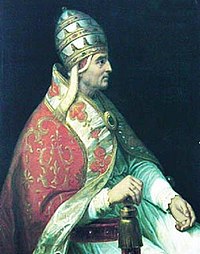Urban V
|
Blessed Pope Urban V |
|
|---|---|
 |
|
| Papacy began | 28 September 1362 |
| Papacy ended | 19 December 1370 |
| Predecessor | Innocent VI |
| Successor | Gregory XI |
| Orders | |
| Ordination | 1334 |
| Consecration | 6 November 1362 by Andouin Aubert |
| Personal details | |
| Birth name | Guillaume de Grimoard |
| Born | 1310 Grizac, Languedoc, Kingdom of France |
| Died | 19 December 1370 (aged 60) Avignon, Papal States |
| Previous post |
|
| Coat of arms | |
| Sainthood | |
| Feast day | 19 December |
| Venerated in | Roman Catholic Church |
| Title as Saint | Blessed |
| Beatified | 10 March 1870 by Pope Pius IX |
| Attributes |
|
| Patronage |
|
Pope Urban V (Latin: Urbanus V; 1310 – 19 December 1370), born Guillaume de Grimoard, was Pope from 28 September 1362 to his death in 1370 and was also a member of the Order of Saint Benedict. He was the sixth Avignon Pope, and the only Avignon pope to be beatified.
Even after his election as pontiff, he continued to follow the Benedictine Rule, living simply and modestly. His habits did not always gain him supporters who were used to lives of affluence.
Urban V pressed for reform throughout his pontificate and also oversaw the restoration and construction of churches and monasteries. One of the goals he made upon his election to the Papacy was the reunion of the Eastern and Western Churches. He came as close as some of his predecessors and successors, but did not succeed.
Guillaume de Grimoard was born in 1310 in the Castle of Grizac in the French region of Languedoc (today part of the commune of Le Pont-de-Montvert, department of Lozère), the second son of Guillaume de Grimoard, Lord of Bellegarde, and of Amphélise de Montferrand. He had two brothers, Étienne and Anglic, the future cardinal, and a sister Delphine.
In 1327, Guillaume Grimoard became a Benedictine monk in the small Priory of Chirac, near his home, which was a dependency of the ancient Abbey of St. Victor near Marseille. He was sent to St. Victor for his novitiate. After his profession of monastic vows, he was ordained a priest in his own monastery in Chirac in 1334. He studied literature and law at Montpellier, and then he moved to the University of Toulouse, where he studied law for four years. He earned a doctorate in Canon Law on 31 October 1342.
...
Wikipedia
